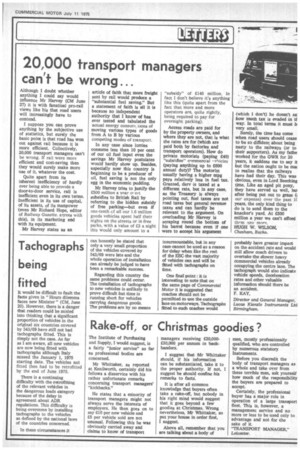20,000 transport managers can't be wrong...
Page 87

If you've noticed an error in this article please click here to report it so we can fix it.
Although I doubt whether anything I could say would influence Mr Harvey (CM June 27) it is with fanatical pro-rail views like his that road users will increasingly have to contend.
I suppose you can prove anything by the subjective use of statistics, but surely the basic point is that road has won out against rail because it is more efficient. Collectively, 20,000 transport managers can't be wrong. If rail were more efficient and cost-saving then they would surely make more use of it, whatever the cost.
Quite apart from its inherent inefficiency of hardly ever being able to provide a door-to-door service, rail is inefficient even in its own terms. Inefficient in its use of capital, of its assets, of its manpower (even Mr Richard Hope, editor of Railway Gazette. aulrees with this), in its marketing and with its equipment.
Mr Harvey states as an article of faith that more freight sent by rail would produce a "substantial fuel saving." But a statement of faith is all it is because no independent authority that I know of has ever tested and tabulated the actual energy consurn. !Lions of moving various types of goods from A to B by various competing modes of transport.
In any case since lorries consume less than 10 per cent of our oil fuel input even the savings Mr Harvey postulates would hardly show up. Besides, especially now this country is beginning to be a producer of oil, fuel saving is not the only egg in the economic pudding.
Mr Harvey tries to justify the £500 million a year cr cit subsidies to British Rail by referring to the hidden subsidy of free parking—but even if one-tenth cf all our 1.6 million goods vehicles spent half their nights on the streets or in free parks, with a value of E3 a night this would only amount to a "subsidy" of £145 million. In fact I don't believe it's anything like this (quite apart from the fact that more and more operators are, quite rightly, being required to pay for overnight parking).
Access roads are paid for by the property owners, and where they are not, that is what the rates are for (which are paid both by factories and' transport operators). How do private motorists (paying £40) "subsidise" corn/net-6a] -ollicles (paying anything up to £600 annual duty)? The motorist usually having a higher mpg pays relatively less in fuel tax. Granted, dery is taxed at a different rate, but in any case, as the Treasury is always pointing out, fuel taxes are not road taxes but general revenue taxes and can hardly be relevant to the argument. On overloading Mr Harvey is scraping round the bottom of his barrel because even if one were to accept his argument (which I don't) he doesn't sa how much tax is evaded in ti way. In total terms it must b very small.
Surely, the time has come when road users should cease to be so diffident about being nasty to the railways (or to their supporters). As my fathe. worked for the GWR for 20 years, it saddens me to say it but the nation ought to be mac to realise that the railways have had their day. This was obvious, even in Lord Beeching time. Like an aged pit pony, they have served us well, WI after being put out to grass (4 our expense) over the past it years, the only kind thing to do is to send them to the knacker's yard. At £500 million a year we can't afford thrm nv mor9.
HUGH W. WILSON, Chesham, Bucks.












































































































































